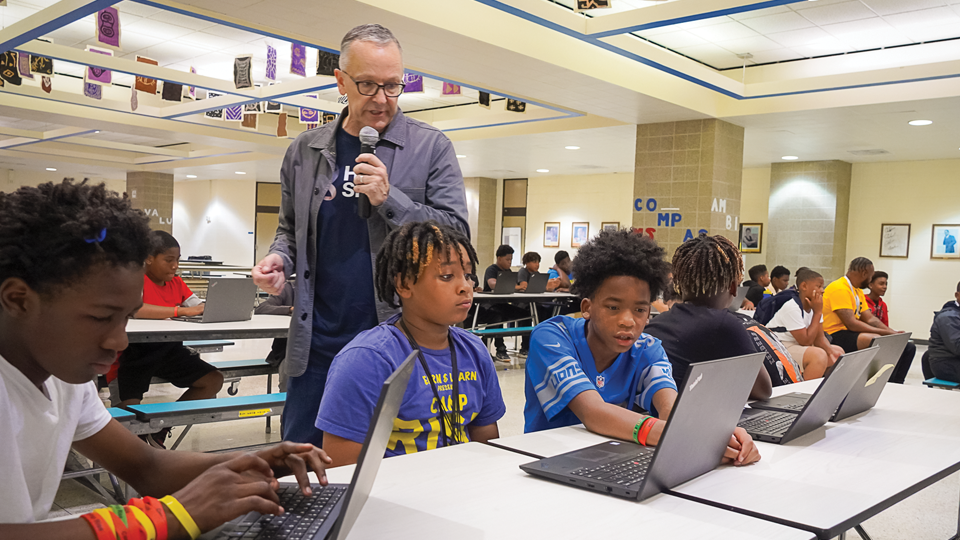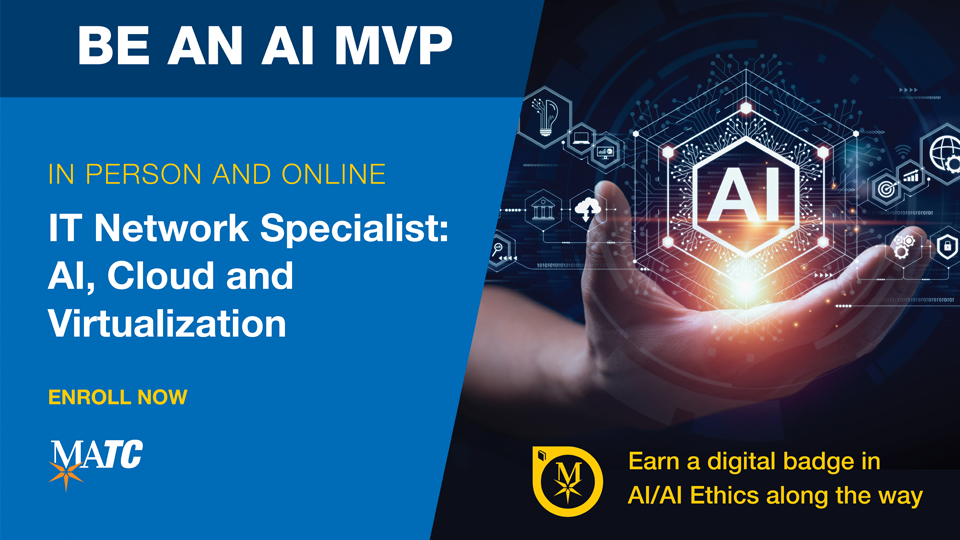
MATC instructors are using the intuitive technology in their classrooms
Looking at his recently graded test in electricity class, the student was shocked.
One of his answers was incorrectly marked wrong. It had to be, the student argued. The answer provided by his instructor didn’t match what ChatGPT, an artificial intelligence platform, said.
“So I asked the student when exactly did ChatGPT attain its degree,” said Levi Cook, an Electricity program instructor at MATC since 2014. “I have to admit, in the beginning I looked down my nose at AI.”
Cook soon had a revelation. In the summer of 2024, he attended a professional development course. AI was a mere bullet point on one slide during the course, but it soon dominated discussion at the session, Cook recalled. He began to see how easy using AI could be, and, more important, how helpful it could be in his classroom.
Since then, Cook has used AI to help develop lesson plans, quizzes, test reviews, rubrics, assessments and hand-on classroom activities. Now he’s so proficient that he can use AI to devise a test review handout summarizing what he had taught during one unit while students take a break.
“My ignorance came from not knowing how to utilize the tool. I had had zero experience with AI,” Cook said. “Now I use it as a virtual assistant. In the past it would take me between two and three hours to develop 20 questions, answers and the incorrect answers for a multiple-choice quiz. With AI, that takes me 15 minutes.”
Cook is not alone. More MATC instructors are using AI in their classrooms, fully supported and encouraged by college administrators and state officials.
MATC President Anthony Cruz, Ed.D., has made incorporating AI one of his strategic goals. He wants the college to be a model when it comes to adopting AI technologies and data analytics.
“AI can help foster a more vibrant and engaged community, and enhance the student and employee experience,” Dr. Cruz said.

Camp Rise introduced students in Milwaukee Public Schools to artificial intelligence. The event came about because of a partnership between MATC, Milwaukee Public Schools, Employ Milwaukee and Kohl’s.
In July 2024, a session on the Wisconsin AI Workforce Action Plan was held at MATC. Created by Wisconsin Gov. Tony Evers, the task force was appointed to adapt and equip a workforce capable of capitalizing on AI’s benefits.
“We need to learn AI because our students are using it. It’s not a choice whether we want to be engaged. We have to start working with it,” said Center for Teaching Excellence Director Julie Ashlock, Ed.D.
The college held a session on AI at its annual MATC Day on October 15, 2024. There, Brian Kirsch, an instructor in the Information Technology department, used AI to create content for an eight-week truck driving course, along with quizzes and tests. It took him about 30 seconds.
“You can do this with any subject. That’s the power of AI,” Kirsch told the crowd at the session. “These things can be time-consuming, and you can have AI do them.”
While AI can build out a truck driving course, Cook and others pointed out you couldn’t print it out, get into a truck and teach the course.
“AI still needs a human brain to function. If you use it right, no one will be losing their jobs,” said Marlena Ward Dodds, lead faculty in the Business Pathway since 2023, at the MATC Day session. “We need to cross-reference what we get from AI. Don’t take everything AI spits out as gospel. You still need to do due diligence.”
Also at the MATC Day session, Heating, Ventilation and Air Conditioning program instructor Doni Bartley, Ed.D., said he uses AI for certain, specific tasks.
“Everyone likes shiny new tools, but you need to make sure they’re the right fit,” Dr. Bartley said. “AI helps you think outside the box. Use it as a starting point.”
By using AI, Cook said he has time to do more interactive, hands-on teaching, which engages students at a much higher level, especially in trade programs.
In MATC’s Automotive Technology – Comprehensive program, students are trained on TruVideo, a software application that incorporates AI in multipoint inspections, often the first step to any car repair. TruVideo allows an automotive technician to send a video directly to customers that shows the findings of a multipoint inspection in non-technical language. The program eliminates the longtime paper inspection sheet given to customers that listed required service.
“I have learned that customers don’t have confidence in work because of a piece of paper, but rather because they see and understand the issues,” said Gregory Chavez, a student in the Automotive Technology – Comprehensive program.
Cook is now so comfortable with AI technology that he shared his expertise in November 2024 at the Wisconsin Technical College System’s annual Faculty Showcase.
“AI is not going away. You can dislike it, but you can’t ignore it,” Cook said. “I’m learning new things every day about refining the process. I don’t think I have even scratched the surface of what it can do.”

matc spotlight
MATC Expands Artificial Intelligence Program
When an emerging technology disrupts the workforce, MATC reacts by enhancing training programs to better prepare workers. With the advent of artificial intelligence, MATC introduced the IT Network Specialist (AI, Cloud and Virtualization) in the Fall 2024 semester.Taught through the STEM Academic and Career Pathway, the two-year associate degree program is the ideal launching pad for a career in information technology. This program update helps students make use of artificial intelligence, incorporating what it is, the ethics of AI and how to use it as a tool, and sets students up for success using and applying this cutting-edge technology in IT.
Students earn an AI ethics digital badge as part of the degree.
The program is an excellent environment for students with existing degrees, adult learners, career changers and displaced workers to learn about AI.
And, because many MATC programs are related, students can earn the IT Networking and Infrastructure Administration technical diploma while working toward completion of the IT Network Specialist associate degree.
Employment opportunities in artificial intelligence are strong. The Bureau of Labor Statistics estimates there will be 11.5 million data-related job openings by 2026. The demand for AI research scientists is expected to grow 19% by 2023, and the demand for robotics engineers is expected to grow 9% by 2023.
The projections clearly indicate the need for AI engineers will continue to grow in the future. The median salary for working on computers and in IT was approximately $100,000. On average, AI research scientists earn $121,393 annually, with experienced professionals earning
